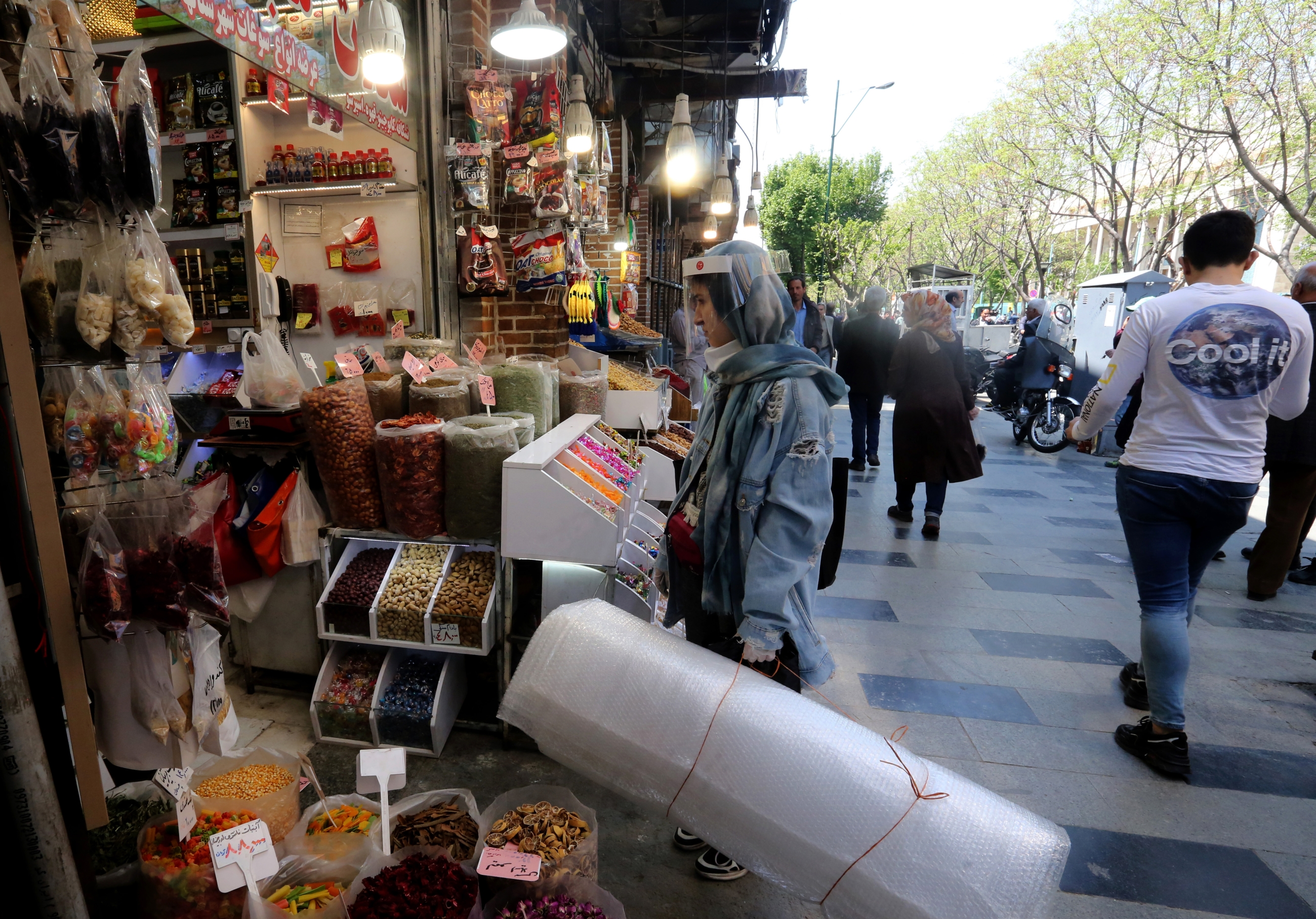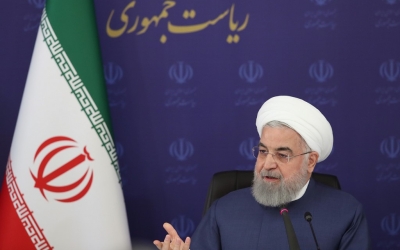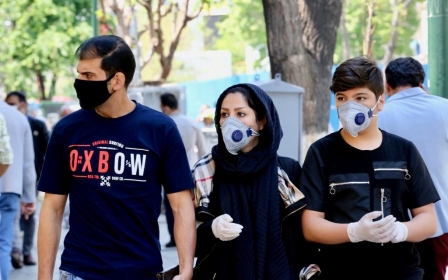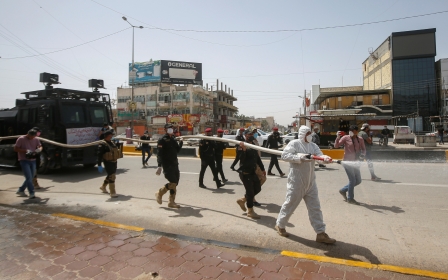Iranian press review: Coronavirus inventions revealed by IRGC and army deemed 'sci-fi'

Iran's military forces ignite old rivalries in search of coronavirus solution
Iran’s Islamic Revolutionary Guard Corps’ (IRGC) claim of inventing a coronavirus detector was met with claims by the country’s regular army of developing a system that kills the virus in five minutes.
Both claims have raised eyebrows among local experts, Iranian health organisations and scientific entities, while political analysts suggested that the news of the anti-coronavirus inventions are just a new phase of an old rivalry between Iran’s two military forces.
Iran has recorded more than 85,990 coronavirus cases and 5,391 deaths.
On 15 March, IRGC commander, Major General Hossein Salami, appeared on Iran’s national TV broadcaster IRIB and unveiled a device, named Mostaan 110, which he said could detect a coronavirus infection within a 100-metre radius based on electromagnetic radiation.
A day later, Iran’s health ministry announced that it had not evaluated the performance of the device, adding that only products approved by the Food and Drug Administration are used in its laboratories and diagnostic department.
Meanwhile, in an immediate rejection of the IRGC claim, Physics Society of Iran released a statement stressing that the alleged invention sounds more like “science fictions”.
Despite the negative reactions to Mostaan 110, the commander of Iran’s Army Ground Forces, Brigadier General Kioumars Heydari, announced on Friday that his forces have produced a new device to eradicate Covid-19.
“Today, Iran Army Ground Force has succeeded in producing systems that zap all kinds of viruses - especially the coronavirus - within a 200-metre radius, by generating a type of gas in the air,” Heydari was quoted by Ana news agency as saying.
However, no further details on these systems were issued, neither were they displayed during the annual parade of Iran’s Army Day on 17 April.
Meanwhile, commentators believe that news of the inventions to contain the coronavirus outbreak is the latest episode of a four-decade-long rivalry between Iran’s regular army and the IRGC.
The IRGC was founded immediately after the 1979 Islamic Revolution, as a reaction to Supreme Leader Ayatollah Ruhollah Khomeini’s mistrust in the loyalty of Iran’s regular army.
Iranians operate businesses underground during pandemic
Iran’s self-employed youth and family business owners, who have not yet been allowed to reopen shop, have gone underground to economically survive during the coronavirus pandemic.
Iran reopened some businesses in the capital Tehran on Saturday and allowed inter-province travels to ease the severe pressure the coronavirus lockdown has had on its sanction-hit economy.
Restaurants, dentists, barbershops and small family businesses have remained shut in the country, however, some Iranians still found ways to support themselves financially.
ISNA news agency has reported that self-employed workers have taken their work underground despite the risks, such as teahouse owners who are serving their loyal customers behind closed doors.
A 31-year-old hairdresser told ISNA that he cannot afford to keep his business closed, adding that now he accepts costumers until 10pm, three days a week, to be able to pay the rent for the shop.
Iran is among the 10 hardest-hit countries by the Covid-19 virus in the world, as of Wednesday the virus has killed 5,391 people and infected 85,996 in Iran.
Labourers take new minimum wage case to court
Tehran’s provincial Islamic labour council has lodged a complaint with the Administrative Justice Court against the labour ministry's decision to increase the minimum wage by 21 percent. The council deems the wage too low considering the current economic crisis in Iran.
The labourers’ representatives and activists have demanded President Hassan Rouhani’s government to consider an increase in the minimum wage that befits the country’s 40 percent inflation rate, a demand that was rejected by the labour ministry.
The announced minimum wage, decided on an annual basis, was put at 18,350,000 Iranian rial (about $118 in open market), while the amount requested by labourers’ representatives was 28,000,000 rial (about $180), according to Iran’s KAMA Press.
The labour activists have also stressed that the official decision was taken unlawfully as the government announced the minimum wage without reaching an agreement with the labourers’ representatives, ILNA news agency reported.
Article 41 of Iran's labor law stipulates that the minimum wage should be determined according to the inflation rate, and the ability of ordinary families to cover expenses.
The decision is made every year by representatives of labourers, employers and the government at the High Council of Labour.
Crime rates increase with prisoners’ furlough
There has been a noticeable increase in the number of crimes related to robbery and drug consumption in Iran following the temporary release of over 100,000 detainees to contain the spread of the coronavirus in prisons, official sources have said.
Tehran’s police chief Hossein Rahimi in a live programme on Iran’s state broadcaster said that the release of the prisoners “has increased troubles” for the police.
Rahimi did not provide any explanation about what kind of difficulties he was referring to nor statistics related to the surge in crime rates.
Meanwhile, reports from Iran’s western province of Kermanshah claim a 50 percent increase in the number of cases of public electricity cables theft.
Provincial authorities have said that the robberies are a result of the nationwide prisoners’ release.
The Shahrvand daily has also reported that the release of over 12,000 drugs-related detainees and addicts from prisons and governmental rehabilitation centres have dramatically increased the presence of crack cocaine and crystal meth addicts on the streets of Harandi and Shoush neighborhoods in southern Tehran.
Nevertheless, officials have extended furloughs for prisoners until 20 May.
Judiciary spokesman Gholamhossein Esmaeili said in a press conference that more prisoners will be pardoned and permanently released in the coming days.
Iranian Press Review is a digest of reports that are not independently verified as accurate by Middle East Eye.
Middle East Eye delivers independent and unrivalled coverage and analysis of the Middle East, North Africa and beyond. To learn more about republishing this content and the associated fees, please fill out this form. More about MEE can be found here.






